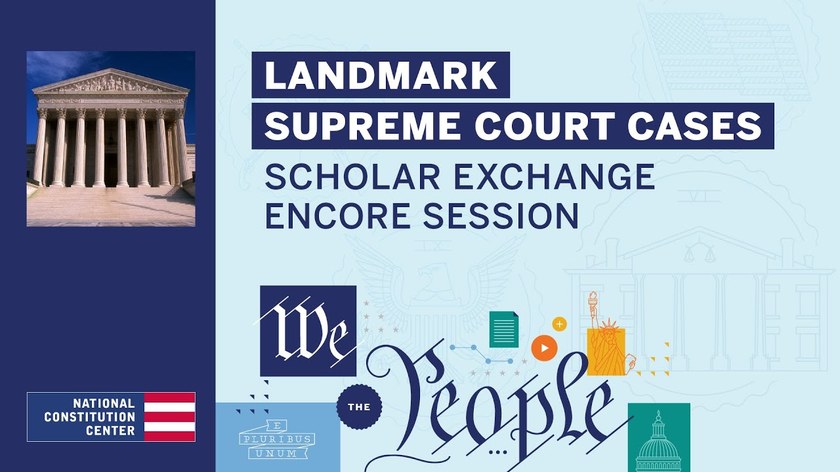
My hope is we will see 2 important court cases be heard. #1 the case against Big Tech and violating Freedom of Speech and the 230 Bill. #2 the upcoming cases filed for Arizona and other states violating the voting process and creating an unfair 2020 Presidential election.
The best-known power of the Supreme Court is judicial review, or the ability of the Court to declare a Legislative or Executive act in violation of the Constitution, is not found within the text of the Constitution itself. The Court established this doctrine in the case of Marbury v. Madison (1803).
People also ask What are the 3 powers of the Supreme Court?
The judicial Power shall extend to all Cases, in Law and Equity, arising under this Constitution, the Laws of the United States, and Treaties made, or which shall be made, under their Authority;--to all Cases affecting Ambassadors, other public ministers and Consuls;--to all Cases of admiralty and maritime Jurisdiction ...
Landmark United States Supreme Court Cases
Marbury v. Madison (1803)
Issue: Who can ultimately decide what the law is?
Result: "It is explicitly the province and duty of the Judicial Department to say what the law is."
Importance: This decision gave the Court the ability to strike down laws on the grounds that they are unconstitutional (a power called judicial review).
McCulloch v. Maryland (1819)
Issue: Can Congress establish a national bank, and if so, can a state tax this bank?
Result: The Court held that Congress had implied powers to establish a national bank under the "necessary and proper" clause of the U.S. Constitution. The Court also determined that United States laws trump state laws and consequently, a state could not tax the national bank.
Importance: The McCulloch decision established two important principles for constitutional law that continue today: implied powers and federal supremacy.
Gibbons v. Ogden (1824)
Issue: Can states pass laws that challenge the power of Congress to regulate interstate commerce?
Result: The Court held that it is the role of the federal government to regulate commerce and that state governments cannot develop their own commerce-regulating laws. Further, the Court created a wide definition for “commerce,” reasoning that the term encompassed more than just selling and buying. In this case, the Court determined that regulating water navigation was in fact an act that regulated commerce.
Importance: The impact of Gibbons is still felt today as it gives the federal government a much-broader base to regulate economic transactions.
Dred Scott v. Sandford (1857)
Issue: In this pre-Civil War case, the question was whether Congress had the constitutional power to prohibit slavery in free territories. A second question was whether the Constitution gave African Americans the right to sue in federal court.
Result: The 1857 Court answered no on both accounts: Congress could not prohibit slavery in territories, and African Americans also had no right to sue in federal court. In reaching these answers, the Court, interpreting the Constitution as it existed before the Civil War Amendments (Constitutional Amendments 13, 14, and 15) abolished slavery, concluded that people of African descent had none of the rights of citizens. The Court further reasoned that slaves were "property" and therefore could not be taken from their owners without due process.
Importance: The Dred Scott case became a central issue in the debate surrounding the expansion of slavery and further fueled the flames leading to the Civil War.
Schenck v. United States (1919)
Issue: Is certain speech, including sending antiwar pamphlets to drafted men, made in wartime and deemed in violation of the Espionage Act, protected by the First Amendment?
Result: No. Although the defendant would have been able to state his views during ordinary times, the Court held that in certain circumstances, like this case the nation being at war, justify such limits on the First Amendment.
Importance: The Schenck decision is best known for creating the "clear and present danger" test meaning that speech could be restricted if it presented a clear and present danger. The decision was also the first to explain the metaphor of falsely yelling "Fire!" in a crowded theater. Schenck was later modified by Brandenburg v. Ohio, which said that speech could be restricted if it would provoke an "imminent lawless action."
Brown v. Board of Education (1954)
Issue: Do racially segregated public schools violate the Equal Protection Clause?
Result: Yes. A unanimous Court overturned Plessy v. Ferguson and held that state laws requiring or allowing racially segregated schools violate the Equal Protection Clause of the Fourteenth Amendment. The Court famously stated "separate educational facilities are inherently unequal."
Importance: The Brown decision is heralded as a landmark decision in Supreme Court history, overturning Plessy v. Ferguson (1896) which had created the "separate but equal" doctrine. In Plessy, The Court held that even though a Louisiana law required rail passengers to be segregated based on race, there was no violation of the Fourteenth Amendment's Equal Protection Clause so long as the accommodations at issue were "separate, but equal." By overturning this doctrine, the Brown Court helped lay the ground for the civil rights movement and integration across the country.
Gideon v. Wainwright (1963)
Issue: Does the Constitution require that any individual charged with a felony, but unable to pay for a lawyer, be guaranteed the free assistance of legal counsel?
Result: Yes, according to a unanimous Supreme Court. The Court held that the Sixth Amendment right to assistance of counsel applies to criminal state trials and that "lawyers in criminal court are necessities, not luxuries."
Importance: Along with the right to assistance for state criminal defendants, the Gideon decision had the effect of expanding public defender systems across the country.
Miranda v. Arizona (1966)
Issue: Are police constitutionally required to inform people in custody of their rights to remain silent and to an attorney?
Result: Yes, the Court found that the Fifth and Sixth Amendments require police to inform individuals in custody that they have a right to remain silent and to be assisted by an attorney. According to the Court, if the police fail to do so, a criminal court judge may rule that any statements made by the accused cannot be admitted as evidence during trial.
Importance: The now famous "Miranda warnings" are required before any police custodial interrogation can begin if any of the evidence obtained during the interrogation is going to be used during a trial; the Court has limited and narrowed these warnings over the years.
Tinker v. Des Moines (1969)
Issue: Does the First Amendment prohibit public school officials from barring students' from wearing black armbands to symbolize anti-war political protest?
Result: According to the Court, yes. The Supreme Court held that students do not "shed their constitutional rights to freedom of speech…at the schoolhouse gate." Consequently, the Court found that the students' speech could only be prohibited if it actually disrupted the educational process. Because there was no evidence of such a disruption, the school was in violation of the First Amendment freedom of speech.
Importance: Tinker has become the central case for any challenges to school-based First Amendment rights.
Roe v. Wade (1973)
Issue: Does the Constitution prohibit laws that severely restrict or deny a woman's access to abortion?
Result: Yes. The Court concluded that such laws violate the Constitution's right to privacy. The Court held that, under the Fourteenth Amendment Due Process Clause, states may only restrict abortions toward the end of a pregnancy, in order to protect the life of the woman or the fetus.
Importance: Roe has become a center-piece in the battle over abortion-rights, both in the public and in front of the Court.
Regents of the University of California v. Bakke(1978)
Issue: Can an institution of higher learning use race as a factor when making admissions decisions?
Result: The Court held that universities may use race as part of an admissions process so long as "fixed quotas" are not used. The Court determined that the specific system in place at the University of California Medical School was "unnecessary" to achieve the goal of creating a diverse student body and was merely a "fixed quota" and therefore, was unconstitutional.
Importance: The decision started a line of cases in which the Court upheld affirmative action programs. In 2003, such academic affirmative action programs were again directly challenged in Gratz v. Bollinger and Grutter v. Bollinger. In these cases, the Court clarified that admission programs that include race as a factor can pass constitutional muster so long as the policy is narrowly tailored and does not create an automatic preference based on race. The Court asserted that a system that created an automatic race-based preference would in fact violate the Equal Protection Clause.
Resource: https://www.americanbar.org/groups/public_education/programs/constitution_day/landmark-cases/

I will have less of a presence on The Torrid Tribe Community. We have very little activity here. This is a sign to me that members have found other social media resources that they are spending more time in. I am happy to see less censorship on social media in general. I started The Torrid Tribe 4 years ago when we were in a state of censorship and lockdowns. It was a difficult time and this was a haven and sanctuary for so many.
I will be lightly posting things here to give you all content to see. This community will always be open to everyone and will resurrect to its full capacity if subscribers show they want it fully operational again with full time administration.
Thank you for being a part of this community. Sending each of you hugs.
K-
Creator of The Torrid Tribe

Passion is the vibe that I want to bring to this community. I want to enjoy your passion for whatever it is you are into. Let's share what we learn - and learn what each other shares. Foodies unite. I love to cook and share recipes. I will regularly post pictures and recipes are available upon request. I would enjoy discussing your past, present and future journeys. Nature is God and Mother Earth's exquisite gift to us. Share a picture and we will enjoy the beauty through your eyes. Let's get deep and consensual with great subjective matter. This is a non judgemental safe place to let everything hang out.
Thank you for your membership contribution subscription. It sponsors our frequent zooms.
For those members that are enjoying this Community, Please consider subscribing. Your commitment will help this Community thrive.
Thank you and hugs.
Torri















